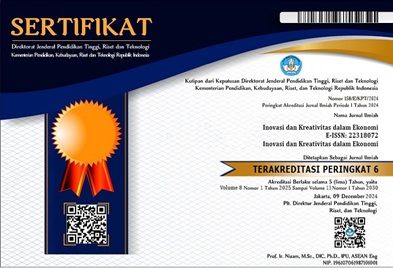ANALISIS FAKTOR-FAKTOR YANG MEMPENGARUHI KEBERHASILAN DESA MERAH PUTIH DI DAERAH PEDESAAN
Kata Kunci:
Desa Merah Putih, Koperasi Desa, Pembangunan Pedesaan, Keberhasilan, Faktor PengaruhAbstrak
Penelitian ini bertujuan untuk menganalisis faktor-faktor kunci yang mempengaruhi keberhasilan program strategis Desa Merah Putih sebagai upaya penguatan perekonomian pedesaan melalui pengembangan koperasi berbasis potensi lokal. Program ini hadir untuk mendorong kemandirian ekonomi desa dengan memberdayakan masyarakat melalui pengelolaan usaha bersama yang profesional dan berkelanjutan. Koperasi sebagai motor utama diharapkan mampu mengatasi keterbatasan akses modal, mengurangi dominasi tengkulak, memperpendek rantai pasok, serta memperbaiki tata kelola ekonomi desa. Penelitian ini menggunakan metode kualitatif dengan pendekatan studi pustaka (library research), di mana data diperoleh dari buku, jurnal ilmiah, laporan resmi, serta kebijakan pemerintah terkait pengembangan desa dan koperasi. Analisis dilakukan dengan menelaah literatur dan regulasi untuk mengidentifikasi peran tata kelola koperasi, kapasitas sumber daya manusia, modal sosial masyarakat, serta dukungan kebijakan dan teknologi dalam keberhasilan program. Hasil analisis menunjukkan bahwa keberhasilan Desa Merah Putih sangat bergantung pada sinergi faktor internal dan eksternal, serta ketahanan terhadap tantangan seperti rendahnya profesionalisme pengelola dan potensi dominasi elit lokal. Oleh karena itu, diperlukan penguatan kapasitas kelembagaan, peningkatan literasi manajemen koperasi, dan sinergi antara pemerintah, sektor swasta, serta masyarakat untuk memastikan keberlanjutan dan efektivitas program ini di masa depan.
This study aims to analyze the key factors influencing the success of the strategic program Desa Merah Putih as an effort to strengthen the rural economy through the development of cooperatives based on local potential. The program seeks to promote village economic independence by empowering communities through the professional and sustainable management of collective enterprises. As the main driving force, cooperatives are expected to address limited access to capital, reduce the dominance of middlemen, shorten supply chains, and improve village economic governance. This research employs a qualitative method with a library research approach, in which data were obtained from books, scientific journals, official reports, and government policies related to rural and cooperative development. The analysis was conducted by reviewing literature and regulations to identify the role of cooperative governance, human resource capacity, community social capital, as well as policy and technology support in the program’s success. The findings indicate that the success of Desa Merah Putih largely depends on the synergy between internal and external factors, as well as resilience to challenges such as low managerial professionalism and potential dominance by local elites. Therefore, strengthening institutional capacity, improving cooperative management literacy, and fostering synergy between the government, private sector, and community are essential to ensure the program’s sustainability and effectiveness in the future.





